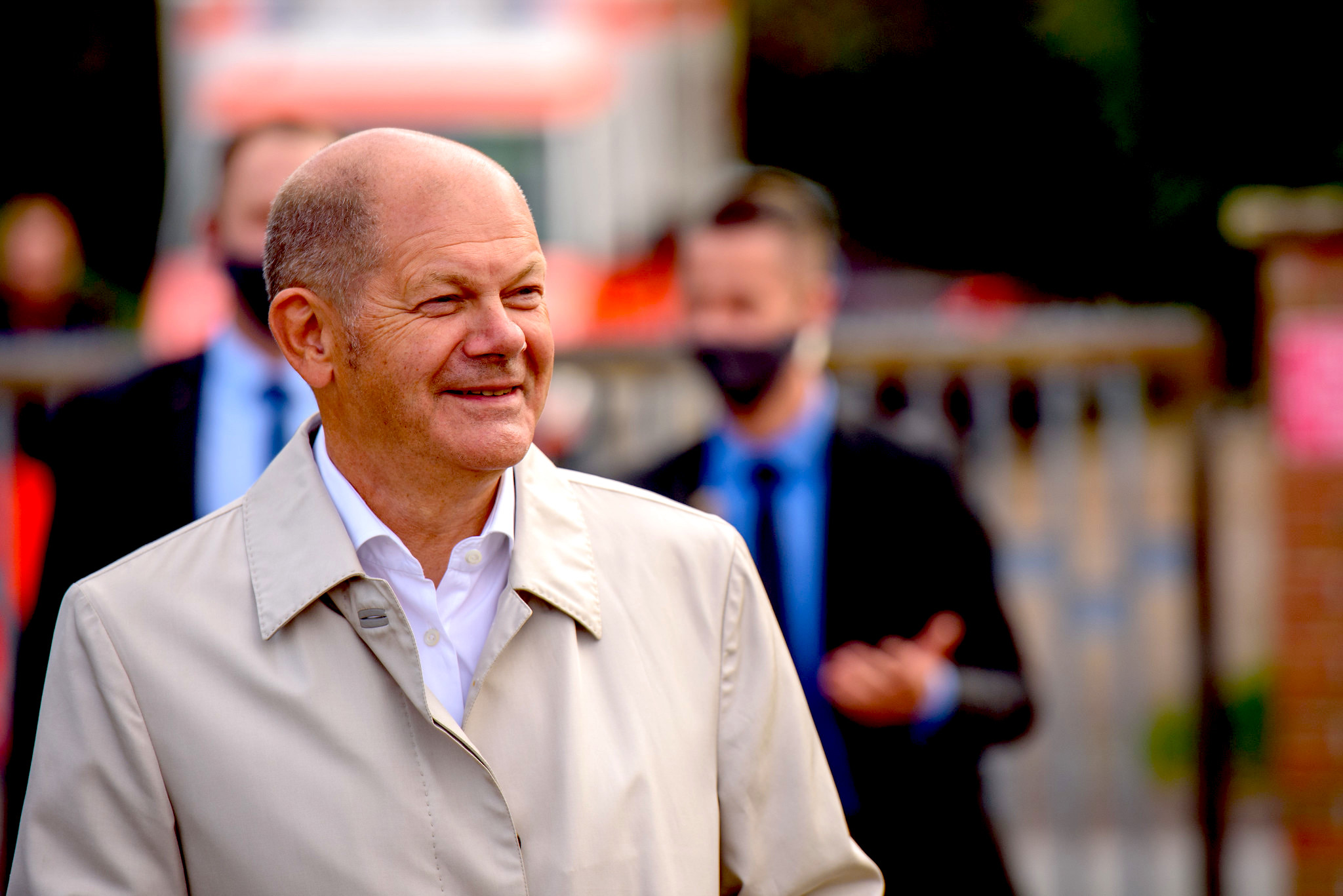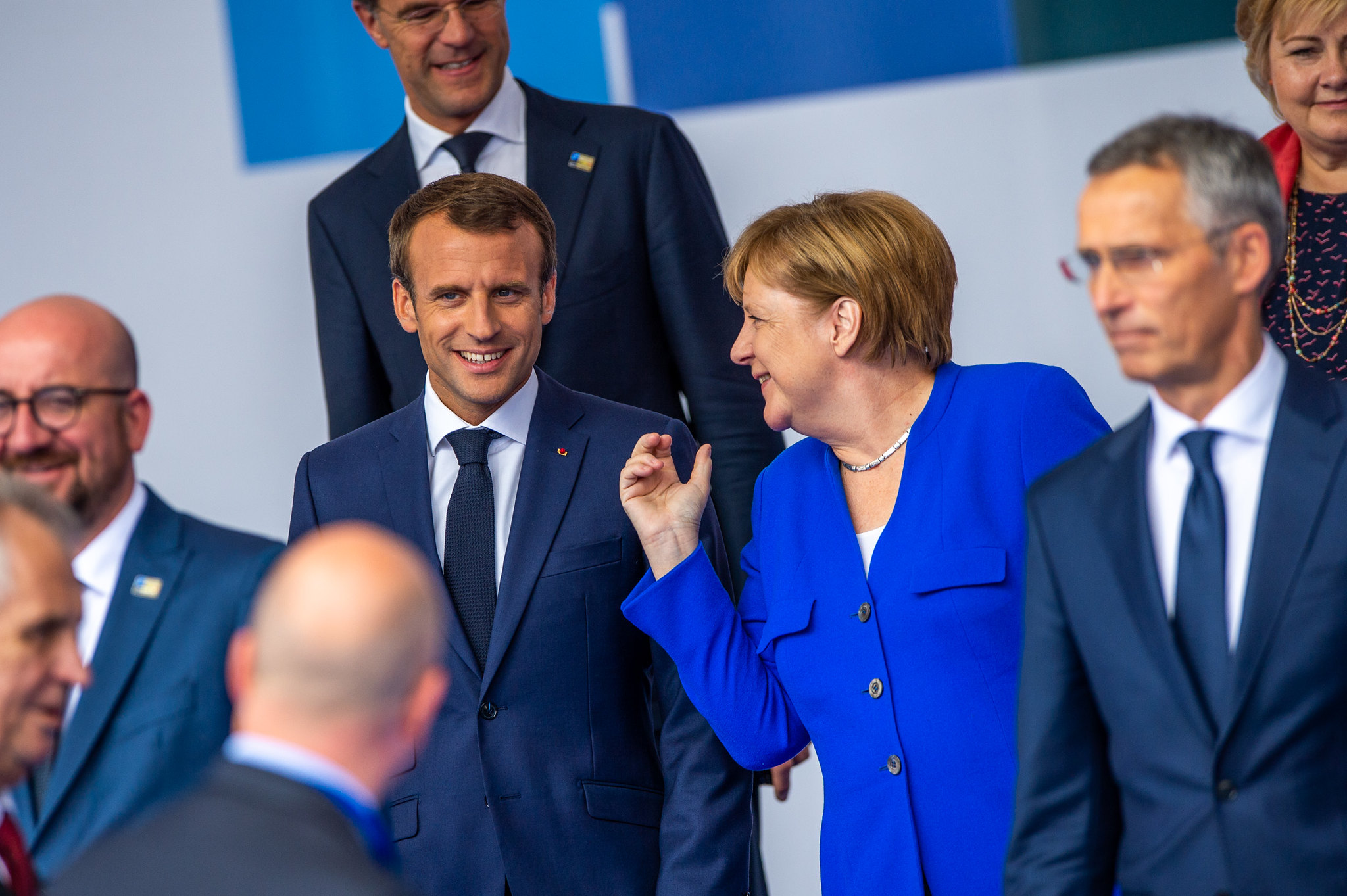James W. Carden says greater EU autonomy would be a good for the United States and the world.

Olaf Scholz, leader of Germany’s Social Democratic Party, in 2020. (Dirk Vorderstraße, Flickr,CC BY 2.0)
By James W. Carden
Globetrotter
 Just what shape Germany’s governing coalition will take is still unclear in the aftermath of the Sept. 26 election, which saw the Social Democrats (SPD), led by Finance Minister Olaf Scholz, come away with just over a quarter of the vote, at 25.7 percent. The balance of power in Germany is now held by the Greens and the Free Democrats, which, taken together, received more votes than the victorious SPD or the Christian Democratic Union, the party of outgoing Chancellor of Germany Angela Merkel.
Just what shape Germany’s governing coalition will take is still unclear in the aftermath of the Sept. 26 election, which saw the Social Democrats (SPD), led by Finance Minister Olaf Scholz, come away with just over a quarter of the vote, at 25.7 percent. The balance of power in Germany is now held by the Greens and the Free Democrats, which, taken together, received more votes than the victorious SPD or the Christian Democratic Union, the party of outgoing Chancellor of Germany Angela Merkel.
The one thing that is certain is that after 16 years in power, Merkel will soon exit the scene. So, the question that now arises is: What shape will post-Merkel Europe take?
 Any answer must begin with an eye on the Élysée Palace, as French President Emmanuel Macron is set to become the senior most partner in the Franco-German partnership that has steered the EU since its founding in 1993.
Any answer must begin with an eye on the Élysée Palace, as French President Emmanuel Macron is set to become the senior most partner in the Franco-German partnership that has steered the EU since its founding in 1993.
There may be major changes afoot should Macron, motivated by the insult handed to him by the United States, the U.K. and Australia with AUKUS — a new trilateral security alliance — pursue his oft-stated desire for European strategic autonomy. As former State Department official Max Bergmann recently observed, AUKUS served to “empower stakeholders in Paris who advocate for a much cooler relationship with Washington and — tapping into the Gaullist foreign policy tradition — wish to be allied with the United States, but not necessarily aligned on key issues related to Russia and China.”
France takes over the six-month rotating presidency of the EU on Jan. 1, 2022, but support already seems to be growing for closer military integration within the EU. On Sept. 2, EU foreign policy chief Josep Borrell noted, “it is clear that the need for more European defense has never been as evident as today — after the events in Afghanistan.” Meanwhile, proposals have been put forward for the creation of a 5,000-soldier rapid reaction force.

French President Emmanuel Macron, center left, with German Chancellor Angela Merkel at a NATO meeting in 2018. (NATO, Flickr, CC BY-NC-ND 2.0)
American officials have long sought to put the brakes on any move toward an autonomous European defense capability. And Macron has a history of criticizing the Atlantic alliance and what he has incisively referred to as the “imported neoconservatism” of his immediate predecessors, Nicolas Sarkozy and François Hollande.
Macron once famously observed that NATO was experiencing “brain death” and appointed former French Foreign Minister Hubert Védrine to fill France’s seat on a NATO commission set up in 2020 to consider the alliance’s future. Védrine has described “the American desire to enlarge NATO to Ukraine” as “unfortunate.”
Should Macron succeed in setting up an independent European defense force, this would lessen NATO’s importance on the continent and give the United States an opportunity to reassess its commitments in the EU, particularly if U.S. President Joe Biden continues to pursue a policy of political isolation and military containment against China.
Please Support Our Fall Fund Drive!
Greater EU autonomy would be a good thing for the United States and the world. It might even serve as an obstacle to the new cold war that the Anglo-American national security establishment seems intent on waging against Russia. And so, it should be welcomed.
After all, former U.S. President Dwight “Ike” Eisenhower, among other architects of the postwar world, never wanted the U.S. to permanently subsidize the European defense umbrella. Furthermore, there is little enthusiasm among the European public for a new cold war by the United States against both Russia and China, as a recent survey by the European Council on Foreign Relations confirms.
Should Marcon emerge victorious in the French presidential election in the spring of 2022, it would not be unreasonable to expect that he may double down on his Gaullist opposition to Atlanticism. In the surprising event he loses to Marine Le Pen, one should expect an even more radical break with the Anglo-sphere.
As things stand now, it looks as though post-Merkel Europe may finally see the Europeans stand on their own.
Ike would approve.
James W. Carden is a writing fellow at Globetrotter and a former adviser to the U.S. State Department. Previously, he was a contributing writer on foreign affairs at the Nation, and his work has also appeared in the Quincy Institute’s Responsible Statecraft, the American Conservative, Asia Times, and more.
This article was produced by Globetrotter in partnership with the American Committee for U.S.-Russia Accord.
The views expressed are solely those of the author and may or may not reflect those of Consortium News.
Please Support Our
Fall Fund Drive!


I fail to see how increasing militarization and more aggressive foreign policies by the EU are supposed to help anyone but EU arms manufacturers! None of the people advocating this — with the possible exception of Macron — show any sign of wishing to reduce NATO; they want EU armed forces and “out-of-area” operations IN ADDITION TO, not INSTEAD OF the existing US/NATO forces. And most of them have been at least willing participants, if not active promoters, of all the imperialist adventures NATO and the USA have engaged in recently. France and Britain participated from the beginning in the attempted overthrow of the Syrian government. And it was France, Britain, and Italy, not so much the USA, that initially launched the attack on Libya.
I do not like Macron but find this part of his policy much more practical than that already showing its failure. The EU slavishly follows the USA even to its own loss eg sanctions on Russia. As for “if U.S. President Joe Biden continues to pursue a policy of political isolation and military containment against China,” with “allies” like Ukraine, of course, what likelihood is there for peace and harmony for anyone? How does the alleged protection of Europe make us safer, with US nukes all over the place making us targets, if there really is a lurking enemy? The UK being out of the EU, Russophobia is reduced except for the Baltic States, Poland and Lithuania, so that is a good start for more cooperation. More troops surely are not needed!!
I think that the first thing that the EU needs to assess is what it needs a rapid reaction force for in the first place. Who’s going to attack them? Turkey? Libya? Russia? Of course, everybody will say Russia but Russia doesn’t have a history of attacking Europe as Europe does in attacking Russia and right at the moment, they are in the process of disengaging with the EU. I would not be in the least bit surprised if Russia quit PACE. What is the point of all these hyper armed militaries other than to be in a continuous round of war games practicing the invasion of Russia, tearing up the countryside, and generally terrifying the populace?
We have seen what a uni-polar world leads to. The adage, “power corrupts and absolute power corrupts absolutely,” could not be more true. The great American experiment has demonstrated exactly that. All that concentrated power did was to fuel a zero/sum ideology that has led us to the bring of the abyss with climate change and the calamities of hatred and war.
Win/win in a truly multi-polar world is the only path I see to a sustainable future for humanity on this planet. Unfortunately, the major obstacle to this is the one, previously “indispensable nation” which seems ready to throw all of humanity under the bus in a reflex tantrum over not getting its own way. It’s been a long fall but here we are.
I do not want to see any more armies but any move to promote an independent Europe as one of the world’s “poles” is welcome.
EU foreign policy chief Josep Borrell noted, “it is clear that the need for more European defense has never been as evident as today — after the events in Afghanistan.” Meanwhile, proposals have been put forward for the creation of a 5,000-soldier rapid reaction force.
—–
This reminds me a cartoon from the period of Carter Administration. POTUS is throwing rabbits from a helicopter, and below a chorus of gentlemen in suits is imploring: Mr. President, it was supposed to be a rapid reaction force, not rabbit!
Where and how this European Rapid Reaction Force would be doing the reacting? Is it to intervene in Afghanistan in an eventuality that the new government will fail in some fashion, and, luck would have it, a European force could act swiftly, decisively and rapidly without any coordination with USA? Is it some new trope for Comedia del Arte? Or troops? Or rabbits?
The question is not what an European Rapid Reaction Force would be doing. It would be the start of forming a combined European Defence Force that would grow in number rapidly (like rabbits) and exclude the UK.